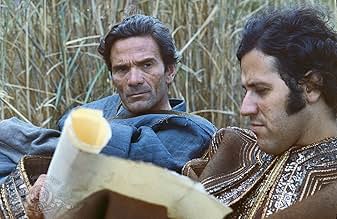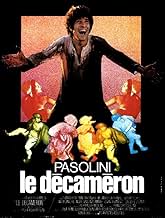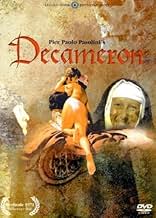VALUTAZIONE IMDb
7,0/10
13.160
LA TUA VALUTAZIONE
Un adattamento di nove storie dal "Decameron" di Boccaccio.Un adattamento di nove storie dal "Decameron" di Boccaccio.Un adattamento di nove storie dal "Decameron" di Boccaccio.
- Regia
- Sceneggiatura
- Star
- Premi
- 1 vittoria e 3 candidature totali
Jovan Jovanovic
- Rustico
- (scene tagliate)
Maria Gabriella Maione
- Una madonna
- (as Gabriella Frankel)
Pier Paolo Pasolini
- Allievo di Giotto
- (as P.P. Pasolini)
Recensioni in evidenza
Pasolini freely adapts ten or so episodes from Boccaccio's fourteenth century collection of hundred short stories. He interweaves the tales of happy or tragic lovers, naughty nuns and lusty priests, naive husbands and cheating but quick-witted wives, inept grave robbers, and a young gardener who got more than he had bargained for, with his own meditations on art, life, death and love. Pasolini himself plays a painter Giotto who observes the characters that inspire him to paint a fresco on the church's wall.
"Decameron" is the first part of Pasolini's "Trilogy Of Life", which continues with adaptations of two other celebrated works of world fiction; "The Canterbury Tales" (1972) and the "Arabian Nights" aka "A Thousand and One Nights" (1974). All these books have been known as distinguished and revered works of literature that belong to the immortal classics. There are probably so many big volumes have been written about them that it would take more than a thousand and one days and nights to read them. They talk about love, death, the meaning of life, and religion but first and most of all they entertain. At the time they were told and written down, no one would think of them as the future academic references. That's why they are so alive, earthy, coarse, and bold. I have not seen two other Pasolini's films but 'Decameron' captures the original spirit of Boccaccio's tales truthfully and with love, humanity, and perfect sense of the medieval Italy.
The film has a look of a renaissance painting not only Italian Renaissance (Giotto) but Netherlandish Northern Renaissance - Peter Bruegel and Hieronymus Bosch.
As he often did, Pasolin used in the film the non-professional actors to play the medieval peasants. They had none of the Hollywood glamor or classical features or perfect teeth and smiles but their faces are interesting, original, and real.
Full of rustic comedy and innocence, earthy humor and lust for life "Decameron" is one of the most optimistic, and celebrating life films ever made. Its sexuality is straightforward and honest, moving and not insulting. This film, my first Pasolini made me want to see the rest of the trilogy and the rest of his films.
"Decameron" is the first part of Pasolini's "Trilogy Of Life", which continues with adaptations of two other celebrated works of world fiction; "The Canterbury Tales" (1972) and the "Arabian Nights" aka "A Thousand and One Nights" (1974). All these books have been known as distinguished and revered works of literature that belong to the immortal classics. There are probably so many big volumes have been written about them that it would take more than a thousand and one days and nights to read them. They talk about love, death, the meaning of life, and religion but first and most of all they entertain. At the time they were told and written down, no one would think of them as the future academic references. That's why they are so alive, earthy, coarse, and bold. I have not seen two other Pasolini's films but 'Decameron' captures the original spirit of Boccaccio's tales truthfully and with love, humanity, and perfect sense of the medieval Italy.
The film has a look of a renaissance painting not only Italian Renaissance (Giotto) but Netherlandish Northern Renaissance - Peter Bruegel and Hieronymus Bosch.
As he often did, Pasolin used in the film the non-professional actors to play the medieval peasants. They had none of the Hollywood glamor or classical features or perfect teeth and smiles but their faces are interesting, original, and real.
Full of rustic comedy and innocence, earthy humor and lust for life "Decameron" is one of the most optimistic, and celebrating life films ever made. Its sexuality is straightforward and honest, moving and not insulting. This film, my first Pasolini made me want to see the rest of the trilogy and the rest of his films.
The erotic and more or less picaresque stories of which this movie is composed is based upon a collection of tales written in the 14th century by Bocaccio an Italian writer already called the Voltaire of 14th century. In the Middle Ages there was a tendency later abandoned, of considering erotic adventures under a humoristic point of view. The most common "hero" of those tales was the cuckold husband. I'm not a great fan of Pasolini. However this movie is more or less successful in depicting a series of funny situations related with erotic entanglements. Its merit is more due to the narrative form than to the stories itselves some them less funny than others. But the composition of the successive scenes develops in a series of pictures full of colour and movement portraying the people in the streets in a realistic way, showing popular types such as peasants, merchants, priests, nuns, etc. most of them with no make-up at all which contributes to create a vivid atmosphere that really puts us in the middle of a mediaeval scenery. Not a masterwork but something worth to be seen anyway.
After adapting "Gospel according to Saint-Matthews" as no one had done before (and after ) him ,in a drastically anti-Hollywood style ("greatest story ever told" and the Italian's opus are worlds apart),Pasolini brushed away the cobwebs from Greek myths such as "Oedipe" and "Medea".Then he began his trilogy of life which would also encompass "the Canterbury tales" and "fiore della mille e una notte".
"Il decameron" is the first and it created the surprise in 1971:no one had been as bawdy as Pasolini at the time (and I wonder if someone had since).This is a movie made up of little sketches ,all adapted from
Boccacio and they respect the original stories (notably the" nightingale" segment)Probably the funniest of the trilogy,and the happiest -both "Canterbury" and "mille e una" feature some dark scenes :a gay is burned alive in the former,an adolescent's murdered in the latter.
That said,"Il decameron" and the two other parts are not for all tastes:bawdiness,vulgarity and scatology may repel some.
"Il decameron" is the first and it created the surprise in 1971:no one had been as bawdy as Pasolini at the time (and I wonder if someone had since).This is a movie made up of little sketches ,all adapted from
Boccacio and they respect the original stories (notably the" nightingale" segment)Probably the funniest of the trilogy,and the happiest -both "Canterbury" and "mille e una" feature some dark scenes :a gay is burned alive in the former,an adolescent's murdered in the latter.
That said,"Il decameron" and the two other parts are not for all tastes:bawdiness,vulgarity and scatology may repel some.
Film lovers know "Andrei Rublov," that Russian film about an icon painter. The beauty of the film comes in part because the filmmaker is on the same quest as his character, and that quest has as its core the discovery of beauty. The interesting thing about movies is that they create and sustain a fantasy world that lives beyond any one movie and into which we assume each movie is born. That world has its own type of beauty, one born of color and glamor and poise.
Paosolini does the same thing as Tarkovsky, but where Tarkovsky dealt with cosmic beauty and recognition, this artist has simpler goals: to engage with flesh, to flow with the simple streams of ignoble daily motion, and to discover beauty in that plain world.
Oh, what a terrific cinematic place to visit! This is a far from that collection of movie metaphors and beauty as we can go. There is no movie acting here. There is no external beauty. There is no recourse to familiar characters or representation. As usual, he draws his source material from matter that is not only before cinema, but before any popular writing.
And he works with that material outside any movie tricks. Well, he still has that Italian tendency to believe that the world is populated by characters and not situations or any sort of fateful flow. Just people who do things. Lots of little things, usually associated with pleasure.
So if you are building a world of cinematic imagination you need to have this as one of your corners. That's silly, every one of us is building a cinematic imagination we cannot avoid it. What I mean to say is that if you are building an imagination, some of which you understand and can use, some of which you actually want and can enjoy without being sucked into reflex...
If you want to just relate to people as people and test how easy it is to find grace in the strangest of faces, then this is your movie voyage for the night.
One rather shocking thing is how the nudity works. In "ordinary" film, we thing nothing of seeing two people humping and moaning, nude pelvises grinding is the most hungry of ways. But we gasp when some genital is shown. Here, the exact reverse is found: no shyness about the obvious existence of genitals, an erection even. A sleeping girl with her hand in her lover's crotch. DIsplayed as if it were in the same cinematic territory as the faces he finds.
But when these characters lay on each other for sex, we have the most prurient of actor's postures. I think this was done simply to avoid an automatic sweep into ordinary film ways. It has that effect anyway.
I don't know anyone that chooses more interesting faces. Distinctly Southern European, odd atypical faces.
And finally, there is the bit of his own story inserted, the artist in the church. Creating scenarios of rich life. In the movie, the most amazing scenes are those that have little or nothing to do with the story. There's a "death" tableau that could be the richest single shot I have ever seen, anywhere.
Ted's Evaluation -- 3 of 3: Worth watching.
Paosolini does the same thing as Tarkovsky, but where Tarkovsky dealt with cosmic beauty and recognition, this artist has simpler goals: to engage with flesh, to flow with the simple streams of ignoble daily motion, and to discover beauty in that plain world.
Oh, what a terrific cinematic place to visit! This is a far from that collection of movie metaphors and beauty as we can go. There is no movie acting here. There is no external beauty. There is no recourse to familiar characters or representation. As usual, he draws his source material from matter that is not only before cinema, but before any popular writing.
And he works with that material outside any movie tricks. Well, he still has that Italian tendency to believe that the world is populated by characters and not situations or any sort of fateful flow. Just people who do things. Lots of little things, usually associated with pleasure.
So if you are building a world of cinematic imagination you need to have this as one of your corners. That's silly, every one of us is building a cinematic imagination we cannot avoid it. What I mean to say is that if you are building an imagination, some of which you understand and can use, some of which you actually want and can enjoy without being sucked into reflex...
If you want to just relate to people as people and test how easy it is to find grace in the strangest of faces, then this is your movie voyage for the night.
One rather shocking thing is how the nudity works. In "ordinary" film, we thing nothing of seeing two people humping and moaning, nude pelvises grinding is the most hungry of ways. But we gasp when some genital is shown. Here, the exact reverse is found: no shyness about the obvious existence of genitals, an erection even. A sleeping girl with her hand in her lover's crotch. DIsplayed as if it were in the same cinematic territory as the faces he finds.
But when these characters lay on each other for sex, we have the most prurient of actor's postures. I think this was done simply to avoid an automatic sweep into ordinary film ways. It has that effect anyway.
I don't know anyone that chooses more interesting faces. Distinctly Southern European, odd atypical faces.
And finally, there is the bit of his own story inserted, the artist in the church. Creating scenarios of rich life. In the movie, the most amazing scenes are those that have little or nothing to do with the story. There's a "death" tableau that could be the richest single shot I have ever seen, anywhere.
Ted's Evaluation -- 3 of 3: Worth watching.
I haven't yet seen too many Pasolini films / I intend to do so though... I suppose many combine him with the disgusting Salo (100 days in Sodoma) but thats not the case here.
In Decameron is actually several shorts, 9 or so, a series of funny tales in medieval Italy with similar touch and atmosphere. The humour is great, we had various laughs in almost every single bit. Some of the humour might of course offend hardcore Christians, but this is by no means a minus in my book. Pasolini's assault to this eras ethics is truly a delight! And even if this dates back to 1971, the stories remain fresh and provocative as is, and this is the height of Pasolini's vision.
Many indicated this as erotic. Sure, there is much of full frontal male and female nudity, some of which quite stimulating, which might be too much for some. But this ain't no erotic film. There are stories which have not erotic element in - and there are nude scenes which function as laugh scenes. Overall, this is a multi-layered short-stories film. I RECOMMEND THIS TO ALL FANS OF COMEDY & European FILMS.
In Decameron is actually several shorts, 9 or so, a series of funny tales in medieval Italy with similar touch and atmosphere. The humour is great, we had various laughs in almost every single bit. Some of the humour might of course offend hardcore Christians, but this is by no means a minus in my book. Pasolini's assault to this eras ethics is truly a delight! And even if this dates back to 1971, the stories remain fresh and provocative as is, and this is the height of Pasolini's vision.
Many indicated this as erotic. Sure, there is much of full frontal male and female nudity, some of which quite stimulating, which might be too much for some. But this ain't no erotic film. There are stories which have not erotic element in - and there are nude scenes which function as laugh scenes. Overall, this is a multi-layered short-stories film. I RECOMMEND THIS TO ALL FANS OF COMEDY & European FILMS.
Lo sapevi?
- QuizIl Decameron (1971) is the first film in Pier Paolo Pasolini's "Trilogy of Life," continuing with I racconti di Canterbury (1972) and concluding with Il fiore delle mille e una notte (1974). Each film was an adaptation of a different piece of classical literature focusing on ribald and often irreligious themes. The tales contain abundant nudity, sex, slapstick and scatological humor.
- BlooperWhen the Mother Superior seduces the deaf-mute boy, he's sleeping in a tomato garden. Tomatoes are a New World crop that wouldn't be brought to Italy for another two centuries. The same is true of the corn (maize) growing in the convent's little field.
- Citazioni
Allievo di Giotto: Why create a work of art when dreaming about it is so much sweeter?
- Versioni alternativeAlthough the cinema version was intact the 1988 UK Warner video was cut by 22 secs by the BBFC to remove shots of naked genitals during the bedroom sex scene with the nun. The cuts were fully restored in the 2001 BFI DVD release.
- ConnessioniEdited into Porno e libertà (2016)
- Colonne sonoreFenesta Ca Lucive
Written by Guglielmo Cottrau, Vincenzo Bellini and Giulio Genoino in 1842
Performed by Franco Citti
Sung by Ser Ciappelletto and his Neapolitan hosts in Germany. Also sung by one of the Neapolitans to a monk.
I più visti
Accedi per valutare e creare un elenco di titoli salvati per ottenere consigli personalizzati
- How long is The Decameron?Powered by Alexa
Dettagli
- Data di uscita
- Paesi di origine
- Lingue
- Celebre anche come
- El decamerón
- Luoghi delle riprese
- Aziende produttrici
- Vedi altri crediti dell’azienda su IMDbPro
Botteghino
- Lordo in tutto il mondo
- 839 USD
- Tempo di esecuzione1 ora 51 minuti
- Mix di suoni
- Proporzioni
- 1.85 : 1
Contribuisci a questa pagina
Suggerisci una modifica o aggiungi i contenuti mancanti

Divario superiore
By what name was Il Decameron (1971) officially released in Canada in French?
Rispondi



























